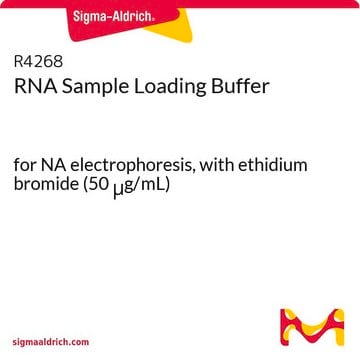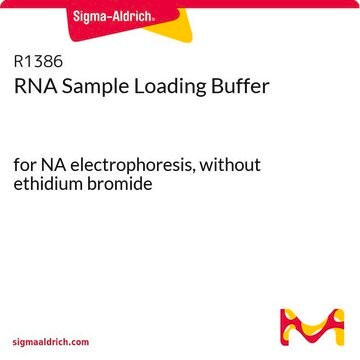M5755
MOPS-EDTA-Sodium Acetate (MESA)
powder for RNA electrophoresis buffers
Synonyme(s) :
MESA Buffer
About This Item
Produits recommandés
Qualité
for molecular biology
Niveau de qualité
Gamme de produits
BioReagent
Forme
powder
Technique(s)
electrophoresis: suitable
pH
6.8-7.2(reconstituted per directions)
Solubilité
H2O: soluble, faintly yellow
Activité étrangère
DNAses, RNases, NICKases, endonucleases, and exonucleases, none detected
Température de stockage
room temp
Description générale
Application
Composants
- 40 mM MOPS
- 10 mM sodium acetate
- 1 mM EDTA (pH 8.3)
Reconstitution
Produit(s) apparenté(s)
Code de la classe de stockage
11 - Combustible Solids
Classe de danger pour l'eau (WGK)
WGK 3
Point d'éclair (°F)
Not applicable
Point d'éclair (°C)
Not applicable
Équipement de protection individuelle
Eyeshields, Gloves, type N95 (US)
Certificats d'analyse (COA)
Recherchez un Certificats d'analyse (COA) en saisissant le numéro de lot du produit. Les numéros de lot figurent sur l'étiquette du produit après les mots "Lot" ou "Batch".
Déjà en possession de ce produit ?
Retrouvez la documentation relative aux produits que vous avez récemment achetés dans la Bibliothèque de documents.
Les clients ont également consulté
Protocoles
TAE and TBE are both used as running buffers for nucleic acid electrophoresis but have some important differences. Review our recipes and video to give your application the best chance of success.
TAE and TBE are both used as running buffers for nucleic acid electrophoresis but have some important differences. Review our recipes and video to give your application the best chance of success.
TAE and TBE are both used as running buffers for nucleic acid electrophoresis but have some important differences. Review our recipes and video to give your application the best chance of success.
TAE and TBE are both used as running buffers for nucleic acid electrophoresis but have some important differences. Review our recipes and video to give your application the best chance of success.
Notre équipe de scientifiques dispose d'une expérience dans tous les secteurs de la recherche, notamment en sciences de la vie, science des matériaux, synthèse chimique, chromatographie, analyse et dans de nombreux autres domaines..
Contacter notre Service technique








